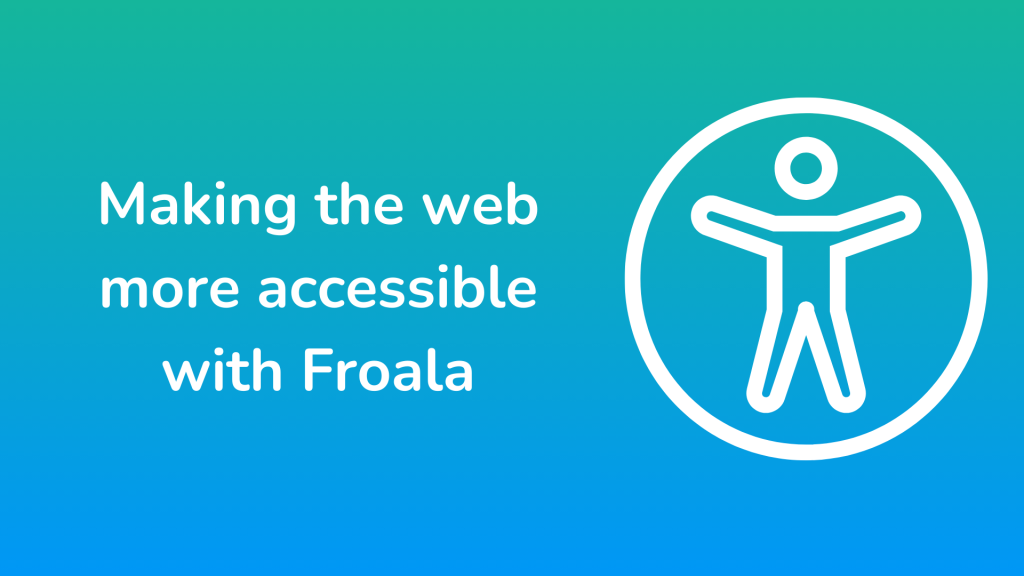Developing Accessible Web Applications with Online Javascript Editors
- Posted on
- By Rimsha Ashraf
- In General,

Making your websites or apps accessible is not a luxury but a need in the modern digital age. Search engine optimization (SEO) efforts make digital platforms available to people with a range of skills, limitations, and preferred ways of using technology. These efforts are good for both users and search engines.
Moreover, online JavaScript editors like Froala help enhance website accessibility. They give developers tools to make websites work well for people with different skills.
Froala is an exceptional online Javascript editor since it prioritizes user accessibility. This online JavaScript editor gives developers a set of tools to make websites accessible to all users. Froala makes it easy to create accessible websites. This is thanks to features like keyboard navigation support and in-line editing.
It doesn’t matter if you’re a seasoned web developer or starting. This article will show you how to use an online JavaScript editor. You can use it to make web apps that anyone can use.
The Importance of Accessibility in Web Development
In web development, accessibility is not a matter of “doing the right thing.” It is also a legitimate and moral obligation.
The Americans with Disabilities Act (ADA) in the United States and the Web Accessibility Directive (WAD) in the European Union are only two examples of the many national and international legislation that require accessible web experiences. Serious penalties, including fines, may result from noncompliance.
Yet, accessibility is not only required by law but also considered key policy:
- Building an Accessible World: Picture yourself cut off from news, entertainment, and other resources because a website wasn’t made to accommodate your specific requirements. Countless individuals with sensory impairments, physical limitations, or mental challenges face this reality every day. All people can engage in the digital world by using accessible websites.
- Improved User Experience for All: Features that make things easier to use are helpful for more than just people with challenges. Regardless of a user’s technological skill or situational constraints, websites are made easier to use with clear labeling, keyboard navigation, and alternative text for images.
- SEO Boost: Search engines like Google prefer accessible websites. They focus on material used by all users. An accessible website will boost your search engine ranking. It will attract more organic visitors and clients.
- Future-proof your website: Accessible websites will become the standard, not the exception. This will happen as technology advances and assistive devices become more common. By including accessibility features during development, you can ensure that your website remains relevant and functional in the future.
Guiding Principles of WCAG
The online Content Accessibility Guidelines (WCAG) establish a set of generally accepted online accessibility principles. These recommendations lay out best practices to ensure that information and user interfaces are sturdy, perceivable, operable, comprehensible, and robust.
Remember that accessibility extends beyond technical conformance, even though WCAG compliance is critical. Building inclusive websites requires an awareness of consumers’ different demands.
Challenges of Building Accessible Web Apps
An online JavaScript editor simplifies web development, but making accessible web apps is difficult. Some editors lack dynamic content, screen reader support, and complicated keyboard navigation.
Additionally, not all developers have deep accessibility knowledge and dynamic content management with assistive technologies can be tricky. Testing and validation can be time-consuming, with manual and automated testing limitations.
You can use an accessibility-focused editor like Froala to create web apps. Anybody can use online JavaScript editors. It offers built-in features like advanced linking, table editing, and keyboard navigation support.
Stay updated on WCAG guidelines and best practices. Use accessibility plugins and extensions to enhance web accessibility. For a complete and efficient procedure, test and use automated tools to find and fix errors.
How Froala Can Help Develop Accessible Web Apps?
Building accessible web apps with online editors can be challenging. Froala is a powerful JavaScript editor built with accessibility in mind. You can navigate those hurdles and create inclusive experiences for everyone.
You can integrate Froala with JavaScript for development using the code below:
<html>
<head>
<meta charset="utf-8">
<meta name="viewport" content="width=device-width, height=device-height, initial-scale=1.0, maximum-scale=1.0" />
<link href='https://cdn.jsdelivr.net/npm/froala-editor@latest/css/froala_editor.pkgd.min.css' rel='stylesheet' type='text/css' />
</head>
<body>
<div id="example"></div>
<script type='text/javascript' src='https://cdn.jsdelivr.net/npm/froala-editor@latest/js/froala_editor.pkgd.min.js'></script>
<script>
var editor = new FroalaEditor('#example');
</script>
</body>
</html>
Froala Built-in Accessibility Features
Here’s how Froala empowers you to create accessible experiences:
- Keyboard navigation: Navigate the editor and content using keyboard controls. Ensure accessibility for users with motor limitations.
- Froala is WAI-ARIA compliant. It uses WAI-ARIA attributes to describe content and functionality for screen readers.
- 508 Compliance: Froala meets the stringent accessibility standards of Section 508. This ensures your apps follow legal requirements.
- Make the alt text of images descriptive: Add it within the editor for impaired users. This action fulfills WCAG Success Criterion 1.1.
Best Practices for Using JavaScript Web Development
The following guidelines are essential to use JavaScript in web development.
- Constant code style: You must agree upon a code pattern and style. This will enhance productivity when working on a large JavaScript project. It involves developer collaboration. Maintaining a consistent coding style makes your code easier to read. It also decreases the likelihood of misunderstandings among team members.
- Use appropriate testing techniques: Testing determines if the final product works as intended. You can reduce vulnerabilities in your code by following effective testing processes. This will prevent malfunctions. In JavaScript testing, people use try/catch. They also use the Behavior-driven development (BDD) technique and avoid using mock.
- Follow the most recent trends: Stay informed about the latest trends in web development to contribute effectively to creating modern websites.
- Correct nomenclature for variables: Functions, Variables, and classes need meaningful and descriptive names. This makes the code easier to read and less confusing for the other project participants.
Bottom Line
Creating accessible web apps is important in web development. It helps ensure the digital content is usable and navigable by individuals with diverse abilities. Online JavaScript editors like Froala can help in this regard.
Froala is more than an online JavaScript editor; it is a collaborator in your efforts to make your content accessible. Froala gives you the ability to create accessible web applications. It provides customizable integrations, practical WCAG implementations, and built-in capabilities. With Froala, you can explore accessible development.
Rimsha Ashraf
Rimsha Ashrafa writer for Froala, showcasing exceptional talent and dedication.
-
Hide Show






No comment yet, add your voice below!